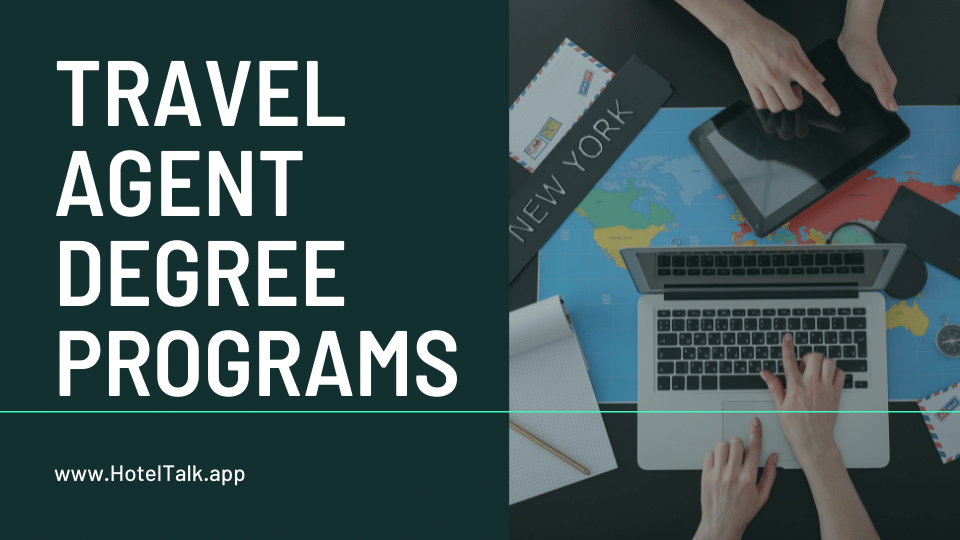Travel Agent Programs Your Guide to Success
Travel agent programs offer diverse paths to a rewarding career in the travel industry. From associate programs to online platforms, you’ll discover the options that best fit your goals and learning style. This guide explores the different types of programs, essential skills, program structures, and the career potential awaiting you.
Understanding the various program types, their costs, durations, and qualifications is crucial. This comprehensive overview compares associate programs, franchises, and online platforms, highlighting the pros and cons of each. We’ll also delve into the skills needed for success, including communication, negotiation, and problem-solving, along with how to develop these abilities.
Travel Agent Program Types

A diverse range of travel agent programs caters to various aspirations and financial situations. Understanding the different program types and their associated characteristics is crucial for aspiring travel agents to make informed decisions. This exploration delves into the key program categories, highlighting their respective advantages and disadvantages.
Associate Programs
Associate programs offer a structured learning path for aspiring travel agents. These programs often involve coursework, practical training, and mentorship. Aspiring travel agents gain a foundational understanding of travel logistics, destination research, and customer service, which are essential for the field.
- Benefits: Structured learning, mentorship, and networking opportunities. Cost-effective entry point for those with limited financial resources.
- Drawbacks: May not provide comprehensive industry exposure compared to other program types. May require more independent effort to secure clients after graduation.
Franchise Programs
Franchise programs provide a pre-established brand and operational framework. Travel agents gain access to marketing materials, customer databases, and support networks. They typically benefit from a pre-defined business model, which is beneficial for those seeking a quicker entry into the industry.
- Benefits: Established brand recognition, pre-existing client base, support systems.
- Drawbacks: Higher initial investment compared to associate programs. Strict adherence to franchise guidelines and restrictions on operational flexibility.
Online Platforms
Online travel agent platforms (OTAs) offer a digital marketplace for travel agents. These platforms allow agents to access a wide range of travel products and services, potentially increasing their client reach.
- Benefits: Broad access to travel products, potential for wider client base, relatively low startup costs.
- Drawbacks: Intense competition among other agents on the same platform. Requires strong digital marketing skills to stand out.
Comparison Table
| Program Type | Cost | Duration | Qualifications |
|---|---|---|---|
| Associate Programs | Low to moderate | 3-6 months to 1-2 years | High school diploma or equivalent, basic computer skills |
| Franchise Programs | Moderate to high | Variable, depending on the specific program | Business acumen, understanding of marketing, and customer service |
| Online Platforms | Low | N/A (ongoing training) | Strong digital marketing skills, knowledge of travel products and services |
Career Paths and Potential Earnings
Career paths for travel agents vary based on their chosen program and individual efforts. Associate program graduates may initially focus on entry-level positions, potentially working for established travel agencies. Franchise program graduates often start their businesses, leveraging the established brand recognition. OTAs offer flexible opportunities to work independently or as part of a team, leveraging digital marketing and communication skills. Earnings vary considerably depending on factors such as experience, client acquisition, and the chosen program. For example, experienced travel agents in established agencies can earn six figures annually, while those operating their franchise businesses may achieve similar levels with dedicated effort and client acquisition.
Skills and Knowledge Required

Becoming a successful travel agent requires a blend of practical skills, in-depth knowledge, and a genuine passion for travel. This blend equips agents to effectively guide clients through the complex process of planning unforgettable journeys. A strong understanding of the travel industry is fundamental, alongside the ability to manage client expectations and navigate unforeseen circumstances.
A comprehensive understanding of the travel industry is crucial for effective client guidance. This involves knowledge of various destinations, transportation options, accommodation types, and travel policies. A keen eye for detail and a proactive approach to problem-solving are vital for ensuring a smooth and satisfying experience for clients.
Essential Hard Skills
Understanding the various aspects of travel is paramount for a travel agent. This includes familiarizing themselves with different destinations, transportation options, accommodation types, and travel policies. A deep understanding of these aspects allows travel agents to effectively assist clients in planning their journeys. Comprehensive knowledge of visa requirements, local customs, and potential safety concerns is also essential for providing well-rounded advice.
Essential Soft Skills
Effective communication, negotiation, and problem-solving skills are crucial for travel agents. These skills enable them to build strong relationships with clients, understand their needs, and address any concerns promptly. These interpersonal skills are vital in navigating the complexities of travel planning.
- Communication: Travel agents need excellent communication skills to actively listen to clients’ needs, clearly explain options, and address concerns promptly. This involves active listening, clear articulation, and empathy to understand the client’s perspective. Travel agents should be able to communicate effectively with clients through various channels, including phone calls, emails, and in-person meetings. They should also be able to adjust their communication style to match the client’s comfort level and preferences.
- Negotiation: Travel agents often negotiate with suppliers to secure the best deals for their clients. This involves understanding the market rates, negotiating favorable terms, and ensuring the best value for the client’s money. This skill allows travel agents to leverage industry relationships to secure better pricing for clients. They should also be prepared to handle potential objections from suppliers.
- Problem-solving: Travel agents frequently encounter unforeseen challenges during the planning process, such as flight cancellations, accommodation issues, or visa delays. A proactive approach to problem-solving is essential to mitigate potential disruptions and maintain client satisfaction. Travel agents should have a range of solutions to address different problems and the ability to remain calm and collected under pressure.
- Time Management: Managing multiple clients and projects simultaneously requires effective time management skills. This includes prioritizing tasks, setting realistic deadlines, and coordinating various aspects of a client’s travel plans. Travel agents need to be able to effectively balance their time to meet deadlines and maintain a high level of client service.
Real-World Examples
Example
A travel agent helps a client who booked a flight with a connecting stop. The client’s connecting flight is delayed, causing a significant change to their itinerary. The agent immediately identifies alternative flights, negotiates with the airline for potential compensation, and proactively informs the client about the options, ensuring the client’s satisfaction and a seamless travel experience. This showcases problem-solving and communication skills in action.
Importance of Industry Knowledge
Staying updated with the latest travel trends, destinations, and policies is crucial for travel agents. The industry is constantly evolving, with new destinations emerging, and travel policies changing. Travel agents need to adapt to these changes to provide the best possible advice and recommendations to clients. This involves researching new destinations, reading travel articles, and attending industry events.
Technology in Modern Travel Agent Practices, Travel Agent Programs
Technology plays a significant role in modern travel practices. Travel agents utilize various software tools to manage client information, book flights and accommodations, and access real-time information. This allows them to efficiently handle client requests and provide accurate information. Staying current with technological advancements in the industry is essential for travel agents.
Program Structure and Curriculum: Travel Agent Programs

Source: tboacademy.com
A well-structured travel agent program equips aspiring professionals with the necessary knowledge and skills to thrive in the dynamic travel industry. The curriculum should cover comprehensive aspects of travel planning, diverse destinations, and the intricacies of tourism. This allows graduates to effectively address client needs and manage travel arrangements.
The curriculum design should balance theoretical understanding with practical application. Emphasis should be placed on hands-on training, allowing students to develop the essential soft skills and technical expertise needed in the field. Practical exercises and real-world case studies are critical for developing problem-solving abilities and building confidence.
Typical Curriculum Modules
The typical travel agent program includes modules focusing on essential aspects of the industry. A solid understanding of these areas allows for effective and comprehensive travel planning. This involves an in-depth study of various destinations, encompassing their cultures, attractions, and specific requirements.
- Travel Planning Fundamentals: This module covers core concepts such as itinerary creation, booking procedures, and understanding travel regulations. Students learn to create personalized travel plans based on client preferences and requirements. This often includes detailed research and comparison of various travel options.
- Destination Studies: This module delves into the specifics of various destinations, focusing on cultural awareness, historical context, and local customs. Students develop an appreciation for the diversity of travel experiences, recognizing the nuances of each location. Examples include detailed study of cultural sensitivities in various countries and regions.
- Tourism and Hospitality: This module examines the tourism industry as a whole, exploring its structure, economic impact, and social responsibilities. Understanding the broader industry context is crucial for travel agents to provide comprehensive travel experiences. This also includes studying the roles of hotels, restaurants, and transportation providers.
Coursework and Training Elements
The coursework typically involves lectures, presentations, case studies, and practical exercises. These elements contribute to the overall learning experience.
- Lectures and Presentations: Provide theoretical knowledge of travel planning principles, destination information, and tourism concepts.
- Case Studies: Allow students to apply their knowledge to real-world scenarios, fostering critical thinking and problem-solving skills. Examples include analyzing specific client needs and developing suitable travel packages.
- Practical Exercises: These exercises simulate real-life travel agency situations, such as handling client inquiries, booking flights and accommodations, and resolving potential issues. This provides hands-on experience and allows students to refine their skills.
Program Structures (Online, In-Person, Hybrid)
Different program structures offer unique advantages and disadvantages.
- Online Programs: Provide flexibility and accessibility, allowing students to learn at their own pace and from anywhere with an internet connection. However, they may lack the interactive learning environment of in-person programs. Examples include online courses with live virtual sessions.
- In-Person Programs: Offer a more immersive learning experience with hands-on activities, group discussions, and direct interaction with instructors. This provides opportunities for networking and building relationships with peers. Examples include classroom-based programs in travel agencies.
- Hybrid Programs: Combine the flexibility of online learning with the benefits of in-person interaction. This structure often includes a blend of online modules and in-person workshops or seminars. Examples include programs with online lectures and in-person practice sessions.
Key Elements of a Successful Travel Agent Training Program
A successful program emphasizes practical application, client-centricity, and continuous learning.
- Emphasis on Practical Application: The program should include substantial hands-on training, using real-world examples and case studies to reinforce theoretical knowledge.
- Client-Centric Approach: The program should focus on developing the skills to understand and meet client needs effectively. This includes empathy and communication skills.
- Continuous Learning: The program should provide opportunities for ongoing professional development, recognizing the ever-changing nature of the travel industry.
Methodologies Used in Teaching Travel Agent Skills
Effective methodologies for teaching travel agent skills often combine theoretical instruction with practical application.
- Role-Playing Exercises: These activities simulate real-life travel agency scenarios, allowing students to practice their communication, problem-solving, and interpersonal skills.
- Interactive Workshops: These sessions encourage active participation and knowledge sharing among students, creating a collaborative learning environment.
- Mentorship Programs: These programs provide opportunities for students to learn from experienced travel agents, gaining valuable insights and guidance.
Preparing Students for Handling Client Needs
The program prepares students for handling client needs by focusing on communication, empathy, and problem-solving.
- Developing Strong Communication Skills: The program focuses on effective communication strategies to understand client requirements and expectations, leading to effective solutions.
- Building Empathy and Understanding: Students learn to understand different client needs and preferences to provide tailored travel experiences.
- Enhancing Problem-Solving Abilities: The program provides opportunities to develop the ability to resolve potential issues during travel planning and execution.
Learning Resources
| Resource | Description | Availability |
|---|---|---|
| Industry Journals | Stay updated on industry trends and best practices. | Subscription-based libraries, online |
| Online Travel Agencies (OTAs) Training | Hands-on experience with booking platforms and tools. | Various OTAs offer training. |
| Travel Agent Associations | Networking opportunities, access to resources, and certification programs. | Local and international associations |
| Travel Blogs and Websites | Informative resources and insights into destinations and travel experiences. | Widely available online |
Closure

Source: professions.ng
In conclusion, travel agent programs provide a structured pathway to a dynamic career. Navigating the different program types, equipping yourself with the necessary skills, and understanding the program structure will set you on the path to success. The detailed information presented here will empower you to make informed decisions about your chosen travel agent program and pave the way for a fulfilling career in the exciting world of travel.





